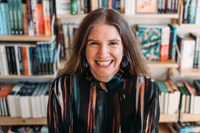Issue 119
Term 4 2021
Supporting Australian book creators
Author Nova Weetman talks to SCIS about her novel Sick Bay, the PLR and ELR schemes and the secrets of libraries.

Nova Weetman holding her latest novel, The Edge of Thirteen, SCIS ID 1999399
I grew up in the outer eastern suburbs of Melbourne along the Yarra River from Warrandyte, in a sleepy orchard town called Wonga Park. It wasn’t big enough for a permanent library. Instead, we relied on the weekly visit of a mobile library full of books. By the time I was ten, I was allowed to ride my yellow bike alone down the road to the tennis courts where the mobile van parked on Tuesdays between 4.00 and 5.30 pm.
First, I’d return my pile of books. Then I’d browse for as long as I could before borrowing some more. As many as I could carry in the cane basket on the front of my bike. The book choice was limited, but we could make requests. Reading was my world. In primary school, it was Judy Blume and Agatha Christie. When I scored an old black typewriter as a birthday present, I started to write murder mysteries, carrying around a suitcase of props as possible murder weapons. Then it was onto Virginia Andrews and the Sweet Dreams series.
In high school we had a library. It was big and well-resourced, but there were limits to the number of books we could borrow. Five a week was not enough for me. So, I dated a boy in Year 7 for three days just to use his library card. That’s how committed I was.
Between reading everything I could get my hands on, I wrote. Angry poetry, mopey love songs, short stories and then finally a novel. It was unpublishable but it was long. Like many authors, my road to publication was slow and meandering. I never intended writing for younger readers but when I had a small child of my own, I found myself writing a young adult novel. When it was published, I realised I’d found my happy place. Years later, I’m still writing for younger readers and between publications, I make living visiting schools and running writing workshops and talks. These are often held in school libraries, surrounded by students who love books as much as I do. It’s a pretty special job.
I’m still a member of a library. Three in fact. And the first thing my teen daughter and I do when a lockdown is announced is race to one of them and stock up. We often don’t even bother with checking titles, and just grab anything with a cover we like.
In Melbourne’s long lockdown last year, we ran out of books. We hadn’t borrowed enough for the endless weeks, and we found ourselves swapping. I read her teen dramas and she read my tales of Irish woe. We found new favourite authors and unexpected joy.
A library means access to stories you’d never dream of if you bought a book in a shop. It means stepping outside your comfort zone, reading something just because you like the cover, or the feel of the paper.
When it came time to choose schools for my children, the first place my daughter and I would suss out on a tour was the library. She chose her primary school this way. And then she chose her high school the same way. Now my children are both at a government school with a library at its heart. At lunchtime it’s so full that the librarians sometimes rotate students.
My middle-grade novel, Sick Bay, features a girl called Meg who spends a lot of time hanging out in the school sick bay reading Anne of Green Gables. I’ve had people ask me why she didn’t go to the school library instead of the sick bay. It’s not like she’s sick. The reason is that her school didn’t have a library that was open at lunchtime. Many schools don’t. So students like Meg must find somewhere else to hide out.
I think about those students who can’t access books. Those students who don’t have shelves of reading at home, or computers to access the world. Those students who want nothing more than to crack a book open and hold it in their hands and read.
Libraries aren’t just for borrowing books. They are for sitting and thinking, for escaping, for just being. For an author they are also an income stream. I remember when I published my first book and received a small advance. I didn’t know about the Australian Government’s Educational Lending Right (ELR) and Public Lending Right (PLR) schemes. Another author explained it to me as if passing on a great secret. Eligible Australian authors and publishers receive annual payments through ELR and PLR as compensation for the copies of their books held in educational and public libraries. Each year that money is often enough to keep my family going for a few months. Without it, I’d be stuck.
I launched my last book in a library down the road. We felt naughty sipping champagne and eating cake. In a library! But it was perfect. Surrounded by books and bookish folk, the library is still my favourite place to be.
Image credits
Images supplied by Nova Weetman
